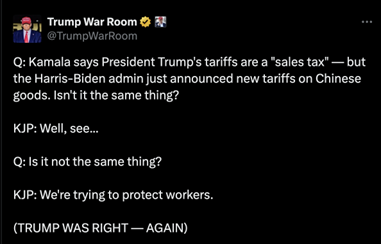
Joe Biden recently undermined Kamala Harris’s campaign by endorsing Donald Trump’s failed Section 301 “China” tariffs.
At last week’s presidential debate, Vice President Harris criticized tariffs proposed by former President Trump as the “Trump Sales Tax.”
Trump responded with the only legitimate response to her claim that tariffs increase prices: “[Y]ou know, if she doesn't like ‘em they should have gone out and they should have immediately cut the tariffs, but those [Section 301] tariffs are there three and a half years now under their administration.”
A mere three days later, President Biden proved Trump right on this point by imposing even more Section 301 tariffs, undermining his vice president’s ability to present voters with an alternative to Trump.
The Trump campaign was quick to call attention to this after Biden Press Secretary Karine Jean-Pierre was asked about the tariffs at a White House press conference.

Specifically, Biden increased taxes on U.S. health care providers who use Chinese-made goods like syringes, needles, medical gloves, and face masks, and he imposed new taxes on Americans who directly purchase “de minimis” goods by applying Section 301 tariffs to imports from China that cost $800 or less.
Groups like the American Health Care Association/National Center for Assisted Living had begged Biden not to impose the medical tariffs, arguing that “The proposed tariff increases will reduce access to life-saving medical supplies and increase costs at a time when providers are struggling to care for patients.”
Meanwhile, economists at UCLA and Yale found that increasing tariffs on affordable imports from China would disproportionately harm low-income households.
The Biden administration’s use of Section 301 of U.S. trade law to impose new tariffs is especially bizarre. Section 301 tariffs are intended to persuade our trading partners to remove their unfair trade barriers. According to a comprehensive analysis by the Office of the U.S. Trade Representatives, Section 301 tariffs imposed by Trump and maintained by Biden have been a spectacular failure in this regard:
The PRC [People’s Republic of China] has not eliminated many of its technology transfer-related acts, policies, and practices, which continue to impose a burden or restriction on U.S. commerce. Instead of pursuing fundamental reform, the PRC has persisted, and in some cases become more aggressive, including through cyber intrusions and cybertheft, in its attempts to acquire and absorb foreign technology, which further burden or restrict U.S. commerce.
The Biden administration’s weird belief that new tariffs on imported syringes and socks will succeed where previous tariffs have failed represents the triumph of hope over experience. Aside from inflicting economic damage on Americans, these new tariffs will also neuter Kamala Harris’s ability to criticize Donald Trump’s radical tariff proposals. It’s time to reject the failed high-tariff policies of the past and pursue a smarter approach based on expanding economic freedom.

